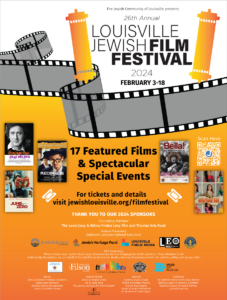By Andrew Adler
Community Editor
Question: Where can you laugh, cry, discover, debate, sip some bourbon, hear actor Saul Rubinek speak trippingly in Yiddish, and – if you’re lucky enough – snare a Golden Ticket to what may be Louisville’s most acclaimed new restaurant?
Answer: the 26th Annual Louisville Jewish Film Festival.
This year’s edition offers no fewer than 17 films and related special events – live and virtual – spread over the course of 16 days. By any measure, it’s a heady declaration of genre shapeshifting.
“What this festival is about is showcasing, educating, entertaining, enriching and building bridges” says Tricia Kling Siegwald, Senior Director of Festivals & Special Projects at the Trager Family JCC. “So our mission is to get this out into the community.”
The festival opens Saturday, Feb. 3 at the Trager Family JCC with a reception and live showing of “Remembering Gene Wilder,” director Ron Franks’ affectionate documentary about the star of such films as “The Producers,” “Blazing Saddles,” “Young Frankenstein,” and “Willy Wonka & the Chocolate Factory.”
“Everyone loves Gene Wilder,” Siegwald says. In that spirit “we’re going to have a Willy Wonka theme, with treats and light hors d’oeuvres. Everyone who walks in will get a little candy bar with a Golden Ticket, and someone will win a gift certificate” to MeeshMeesh, Israeli-born chef Noam Bilitzer’s lauded NuLu restaurant.
That evening will include a recorded cameo appearance by comedian Ariel Elias, who’ll talk about what the festival describes as “the value of humor, especially in tough times.”
This opening event is sponsored by Wilma Probst Levy, who with her late husband Louis Levy has for many years been a stalwart festival supporter.
“Louis was very committed to Louisville and to Jewish life in Louisville, she said, speaking via Zoom from her current home in Washington, D.C. “So in 1998 he decided to create the Theater and Film Festival Fund —later he put more emphasis on the ‘film.’ That was his passion, and I shared that passion with him and still do.”
Eleven of the 17 films will be virtual – available for Louisville-area viewers to watch on their digital device of choice.
“I’m very happy with the variety of films we have this year,” says festival committee co-chair Keiley Caster, “including documentaries, comedy, and drama. All our films are thought-provoking and have passed several steps to be in the festival. First, a film has to be selected by our preview committee. Then the whole committee selects the films that make the festival’s lineup.”
One of the most intriguing of the virtual offerings is “Shttl,” French director Ady Walter’s 2022 feature film about a Ukranian shttel – a small, predominantly Jewish town – on the verge of being invaded by Russia in 1942. (The title’s missing “e” alludes to Georges Perec’s 1969 novel “La Disparition” (“The Void”), written entirely without that letter.)
The best-known actor in “Shttl” is Saul Rubinek — known for such roles as pulp-fiction writer W.W. Beauchamp in Clint Eastwood’s 1992 epic Western film “Unforgiven,” and the nebbish divorce lawyer Donny Douglas on the TV series “Frasier.”
In “Shttl” he plays the town’s Rebbe, a small but important role he shot over the course of two days during the summer of 2021, on an elaborate set comprising 25 separate buildings about an hour from the capital city of Kyiv. The set – now littered with mines sewn by the Russian army during its subsequent invasion of Ukraine – included a full-size synagogue that was consecrated by a Ukrainian rabbi seven months before war broke out in 2022.
The film’s dialogue is entirely in Yiddish and Ukranian. As the only child of parents who immigrated to Canada (after surviving the Holocaust thanks to a Polish farmer who hid them for two years), Rubinek had mastered Yiddish before he learned to speak English. “Shttl” re-connected him to a not-so-distant past in which one way of life gave way to another.
“This was a very small community,” he says of the film’s setting, “a hamlet, a little town, a village. There were hundreds, if not thousands of them throughout Eastern Europe. In these villages lived side-by-side with non-Jewish ones, whether they were Polish, Ukrainian, Romanian – whatever country they were in. They existed for hundreds of years, with occasional violence. But mostly they figured out a way to get along with their neighbors.
“The rabbi of this particular village is a leader, the spiritual leader of the community,” Rubinek explains. “He’s an elder, and he’s got his own troubles – it’s not ‘Fiddler on the Roof.’ It’s a more realistic depiction of the kind of controversies that existed within shtetl life. There are very religious or Orthodox; there are atheists; there are feminists; there are communists; there are Zionists. Even in a community with as few as 100 people there are a lot of different factions, with arguments and intellectual as well as spiritual clashes. The rabbi has to find a way to keep the community together. Unfortunately, the only way you could have unified the community for survival would have been to arm them. But that was not in the nature of this culture.”
On Feb. 7 at 7 p.m., Rubinek will participate virtually in a discussion about the film and his diverse career with Adath Jeshurun Cantor David Lipp.
Such special events are a hallmark of the festival. A particularly distinctive example arrives Feb. 10 from 7:30-9:30 p.m., when “Shorts & Shots” comes to the Louisville Slugger Museum and Factory, 800 W. Main St. Described as “a short film and bourbon experience,” the event ($36 per person) will offer tastings led by Phil Kollin, Executive Bourbon Steward with the Stave & Thief Society. Admission also includes a Slugger Museum and Factory souvenir plus a guest pass for a subsequent museum visit.
Feb. 8 at 7 p.m., the festival will present a live showing of “Bella!” – a documentary film about the fiery, groundbreaking New York congresswoman Bella Abzug – at the Baxter Ave Theater. Afterward there will be a discussion featuring Kentucky State Senator and physician Karen Berg, and Kentucky ACLU Executive Director Amber Duke.
Another live showing/discussion at the Baxter comes Feb. 15 at 7 p.m., when the festival presents “Checkpoint Women | Memories” – about “a group of Israeli women who established Checkpoint Watch to guard the human rights of those passing through the checkpoints between Israel and the West Bank.”
There will be a post-showing discussion with Ranen Omer-Sherman – head of the Jewish Studies program at the University of Louisville – and Matt Golden, director of the Jewish Community Relations Council.
Feb. 17 at 7:30 p.m. – back at the Trager Family JCC – there will be a live showing of “My Neighbor Adolf,” weaving a tale about a “grumpy” Holocaust survivor living in Colombia who discovers that a “mysterious old German man” – who he’s convinced is Adolf Hitler — has moved in next door. After the showing, director Leon Prudovsky will join in a discussion via Zoom with Asaf Angermann, Assistant Professor Term of Philosophy and Jewish Thought at U of L.
It’s a eclectic assortment of films and subjects – which, again, is the point.
“We have a diverse community and want to be able to show films that will speak to all kinds of people,” says Janet Hodes, co-chair of the festival committee, acknowledging that “not every film (is) going to speak to the same people. Some people prefer comedies; some people prefer documentaries. Some people want to be pushed in (their) film experience. Some people want to really learn something that will reflect on the Jewish experience. And, there are a lot of non-Jews in our audience.”
In other words, this is a festival that punches considerably higher than its relatively small-market weight.
“It’s not unusual for the films our committee chooses to be on the cutting edge of what’s happening around the nation,” Hodes says. “So here we are in little Louisville at the forefront.”
For tickets and more information about the 26th Annual Louisville Jewish Film Festival, go online here




